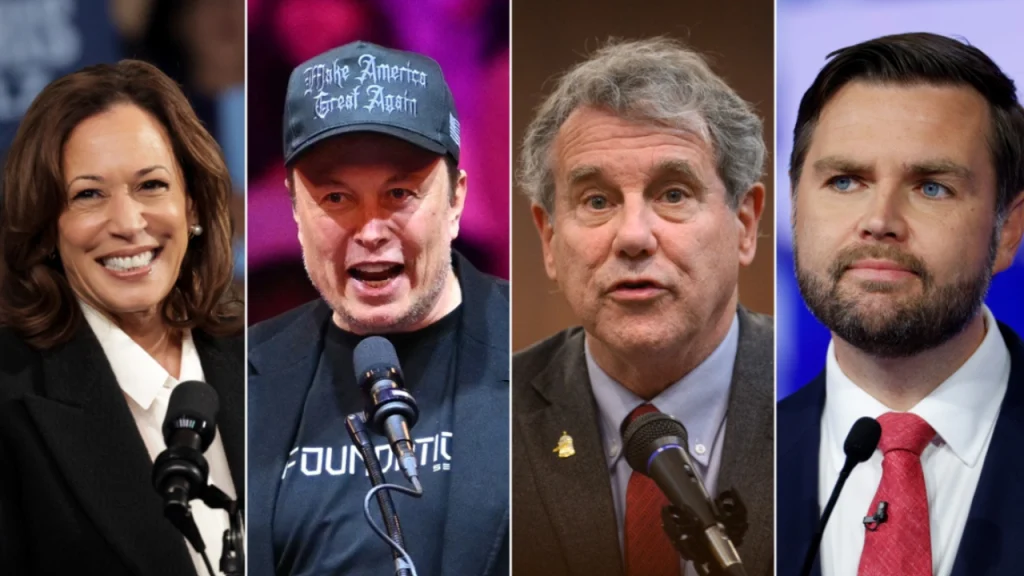2024: A Year of Political Upheaval and Triumphant Comebacks
The political landscape of 2024 underwent a seismic shift, marked by the unexpected resurgence of Donald Trump and a Republican takeover of Congress. Trump’s triumphant return to the presidency, defying predictions of his political demise, stands as a remarkable comeback story. Having navigated indictments, impeachment attempts, and even assassination attempts, Trump secured a victory that reverberated throughout the political world. This victory was further solidified by Republicans gaining control of both the House and Senate, providing a strong foundation for Trump’s upcoming term.
Kamala Harris’s Failed Bid and the Vice Presidential Pick That Doomed Her Campaign
In contrast to Trump’s success, Kamala Harris and her running mate, Minnesota Governor Tim Walz, experienced a significant political setback. After President Biden’s withdrawal from the race, Harris faced an uphill battle to convince voters to continue the policies of the Biden-Harris administration. The selection of Walz as her running mate proved to be a strategic misstep, overshadowing Harris’s campaign with a series of gaffes and controversies. Political analysts widely criticized the choice, suggesting that other candidates would have been more suitable and potentially averted the ultimate downfall of the Harris-Walz ticket. This decision underscored the importance of the vice presidential selection and its potential impact on the overall campaign.
Elon Musk’s Rise as a Political Powerhouse
Beyond the presidential race, 2024 witnessed the emergence of Elon Musk as a prominent political figure. Publicly endorsing Trump, Musk became a visible presence on the campaign trail, even adopting the "Dark MAGA" moniker. His influence extended beyond the campaign, leading to his appointment, alongside Vivek Ramaswamy, to head the newly formed Department of Government Efficiency. This new department, focused on reducing government waste, quickly gained bipartisan support, further solidifying Musk’s position as a powerful force in Washington.
The Decline of Soros-Backed Progressive Prosecutors
The year also saw a significant decline in the influence of progressive prosecutors backed by George Soros, particularly in California. Voters in California overwhelmingly rejected progressive policies on crime, rolling back key provisions of Proposition 47 which had downgraded certain theft offenses from felonies to misdemeanors. This shift reflected a growing public concern over rising crime rates and a rejection of the "soft-on-crime" approach. The recall of Alameda County District Attorney Pamela Price and the electoral defeat of Los Angeles District Attorney George Gascón further demonstrated this trend, signaling a potential turning point in the national debate on criminal justice reform.
JD Vance: From Controversial Pick to Potential Future President
Despite initial skepticism from some corners, JD Vance, Trump’s vice presidential pick, emerged as a strong political figure. Initially viewed as a potentially divisive choice, Vance’s performance on the campaign trail and in debates significantly boosted his favorability ratings. His relative youth and connection to the MAGA base position him as a potential frontrunner for the 2028 Republican presidential nomination, solidifying his place as a rising star within the party.
Democratic Senate Losses Pave the Way for Republican Control
Finally, the Republican takeover of the Senate was marked by the defeat of several long-serving Democratic incumbents. Sherrod Brown of Ohio, Bob Casey of Pennsylvania, and Jon Tester of Montana all lost their reelection bids to Republican challengers. These losses underscore the changing political dynamics in these states and solidified the Republican majority in the Senate, further empowering the incoming Trump administration. These elections signify a significant shift in the balance of power, with potential long-term implications for the political landscape.

